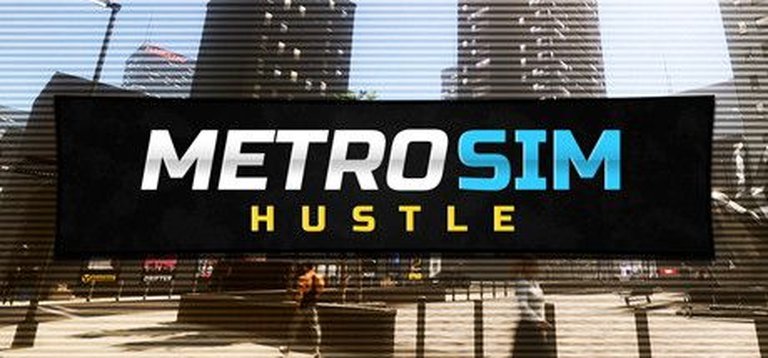- Release Year: 2021
- Platforms: Windows
- Publisher: Departure Interactive
- Developer: Departure Interactive
- Genre: Role-playing, RPG, Simulation
- Perspective: 1st-person
- Game Mode: Single-player
- Gameplay: Simulation
- Setting: Contemporary
- Average Score: 78/100

Description
Metro Sim Hustle is a simulation game where you drive an underground commuter train and manage your character’s needs while hustling to climb the property ladder in a city with diverse residents and opportunities. You start with a humble beginning, sleeping on a stained mattress, and progress by earning money through various means, including selling items to NPCs.
Where to Buy Metro Sim Hustle
PC
Patches & Updates
Guides & Walkthroughs
Reviews & Reception
steambase.io (78/100): Metro Sim Hustle has earned a Player Score of 78 / 100. This score is calculated from 374 total reviews which give it a rating of Mostly Positive.
rockpapershotgun.com : Metro Sim Hustle presents a reality in which commercial train drivers are mostly homeless drug dealers who were inexplicably handed the keys to a train one day.
Metro Sim Hustle: Review
Introduction
Metro Sim Hustle, developed and published by Departure Interactive, is a unique blend of train simulation, role-playing, and life simulation elements. Released on July 24, 2021, for Windows on Steam, this game has piqued the interest of many due to its eclectic mix of gameplay mechanics. At its core, Metro Sim Hustle challenges players to manage a commuter train while navigating the complexities of urban life, including real estate, entertainment, and personal needs. This review will dissect the game into its core components to understand its development history, narrative, gameplay mechanics, world-building, reception, and overall legacy.
Development History & Context
Metro Sim Hustle is the brainchild of Departure Interactive, a studio that has ventured into creating a game that combines various genres. The game’s development is rooted in the Unity game engine, which is known for its versatility and ease of use for developers. At the time of its release, the gaming landscape was saturated with simulation games, but Metro Sim Hustle managed to carve out a niche by incorporating elements from RPGs and life simulations.
The game was released during a period when indie game developers were increasingly experimenting with novel concepts and gameplay mechanics. Metro Sim Hustle’s unusual blend of train driving and life simulation reflects this trend. The studio’s vision was to create a game that was not only about driving trains but also about living a virtual life, with all its attendant challenges and opportunities.
Narrative & Thematic Deep Dive
The narrative of Metro Sim Hustle is centered around a protagonist who starts with minimal resources and must work their way up in a city filled with opportunities and challenges. Players begin by driving a commuter train and engaging in various side activities to earn money. The game has a unique premise where the protagonist starts as a homeless character, reflecting a gritty, realistic urban environment.
The game’s story is not traditional; instead, it’s more sandbox-oriented, where the player’s actions and decisions drive the progression. The thematic elements include climbing the social ladder, managing personal needs, and interacting with the city’s diverse residents. The game’s setting presents a somewhat dystopian or at least challenging urban environment where the player must hustle to succeed.
Gameplay Mechanics & Systems
Metro Sim Hustle’s gameplay is multifaceted, including train driving, character progression, and life simulation elements. Players must manage their character’s basic needs such as hunger, sanity, and hygiene. The train driving simulation is detailed, requiring players to adhere to schedules, manage speed, and perform tasks like updating destination boards.
One of the unique aspects of the game is its “hustle” system, where players can engage in various activities to earn money, including selling items to NPCs who have specific preferences. The game also includes a real estate system, where players can upgrade their living situation and customize their homes.
The UI is generally straightforward, with in-game phone apps allowing players to manage various aspects of their life, such as ordering food or checking messages. However, some players might find the need to micro-manage their character’s needs to be somewhat tedious.
World-Building, Art & Sound
The world of Metro Sim Hustle is set in a contemporary, urban environment that is somewhat gritty and realistic. The art style is not overly detailed but sufficient to convey the game’s atmosphere. The city is filled with various locations, including a strip club, a sushi bar, and a clinic, each providing a unique aspect to the game’s world.
The sound design complements the game’s atmosphere, with appropriate sounds for the train simulation and urban environment. The overall aesthetic and sound design work together to create an immersive experience, despite some of the more unusual elements of the game.
Reception & Legacy
Metro Sim Hustle received a “Mostly Positive” rating on Steam, based on 374 reviews, indicating a generally positive reception from players. Critics have noted the game’s originality and the developer’s bold vision. However, the game’s niche appeal and some of its more controversial elements (such as the ability to urinate on objects) have also been subjects of discussion.
The game’s legacy is still unfolding, but it has already been noted for its innovative blend of gameplay mechanics. As an indie title, it represents the kind of creative risk-taking that is possible in the current gaming landscape.
Conclusion
Metro Sim Hustle is a fascinating game that combines multiple genres in a unique way. While it may not appeal to everyone due to its niche elements and some potentially off-putting features, it is undeniably a product of innovative game design. The game’s ability to balance train simulation with life simulation and RPG elements is commendable.
In conclusion, Metro Sim Hustle is a noteworthy title that contributes to the diversity of the gaming landscape. Its place in video game history is still being written, but it is certainly a game that has sparked interesting discussions and reflections on the nature of game design and player experience.